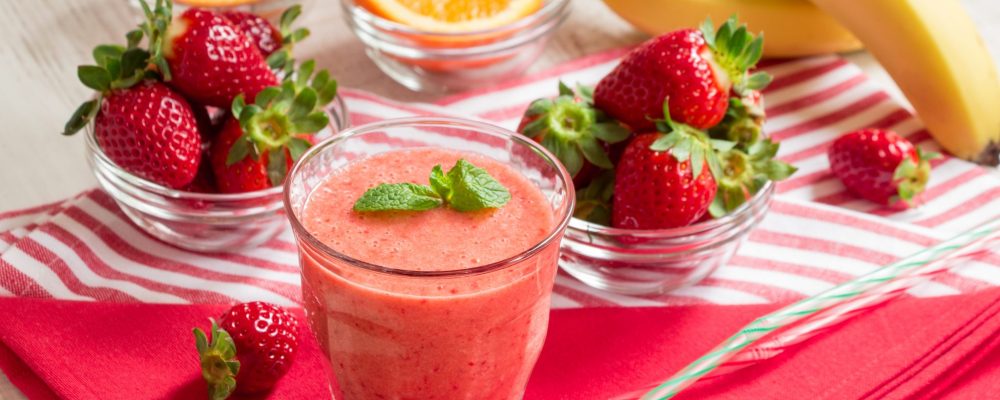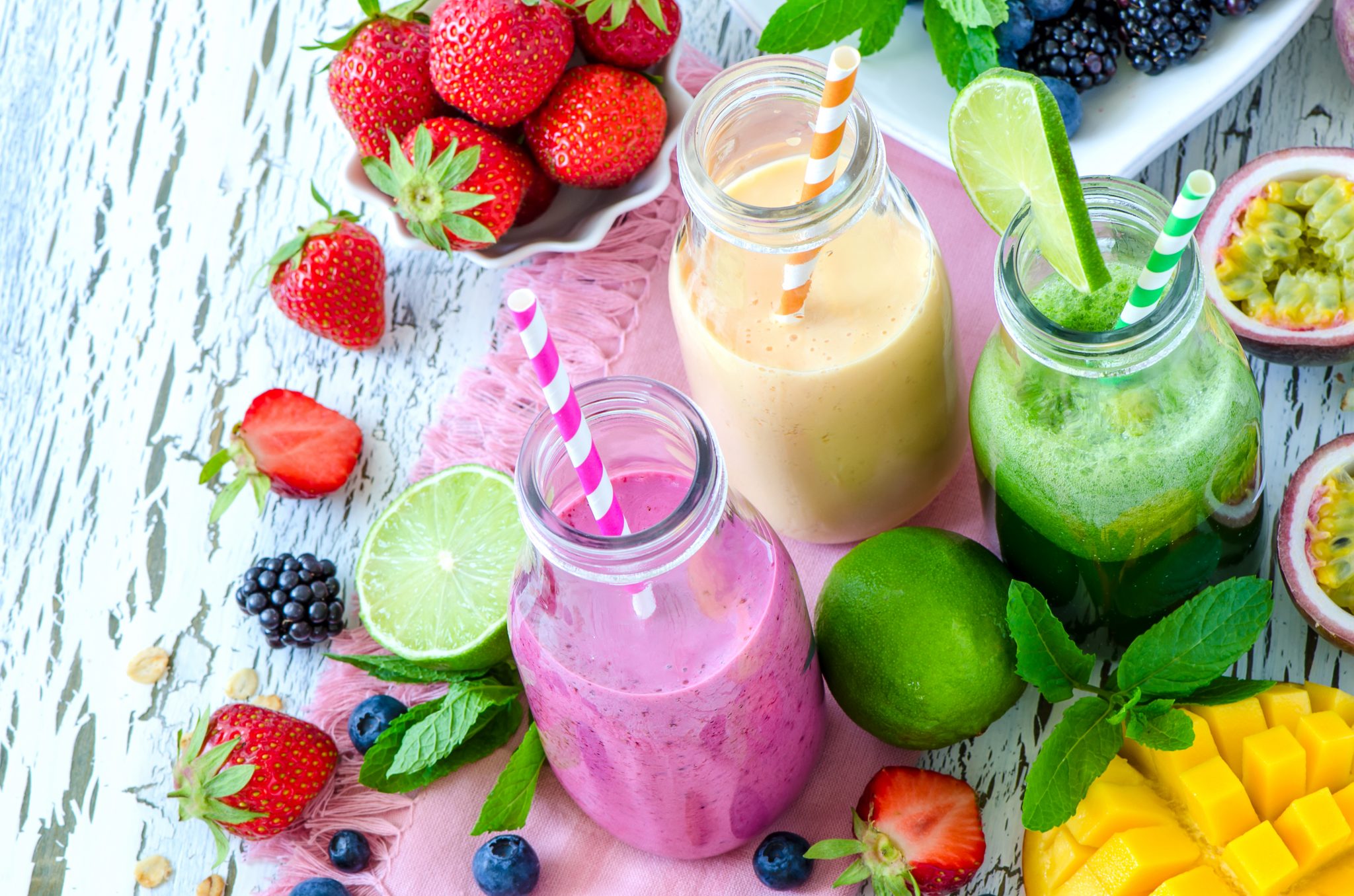Are your kids getting loads of sweets and chocolate bars everywhere they go? Or is it only my kids that are being overloaded with unhealthy well-meant treats? Our cupboard is full of snacks that I didn’t buy and I’m not happy about at all.
I want to raise my children in a healthy way and white refined sugar is one of the things I’m trying to avoid. Last year around Christmas time we’ve received huge amount of sweets. Most of them ended up in a bin (I’m sorry grannies, aunts and uncles, I know you mean well…) So this year, we’ve made sure to tell everyone in advance, that we DO NOT wish to receive any sweeties. And guess what, it worked! I was so pleased to see bananas and tangerines instead of chocolate bars in little Santa bags. At least until I realized that now I have more than 8.5 kg of fruits on my kitchen table (I really did weigh it). What should I do with all these fruits? I need to process them before they go off…
The only thing I could think of was making smoothies. There’s just one catch in it. Smoothies are full of sugar too. So I decided to make a research about how much sugar there is in fruits to determine how much smoothies do I want my kids to drink.
Are smoothies healthy?
The healthiest way to receive nutrients from fruits is to eat it solid. Chewing and mixing it with saliva in your mouth is the right start of digestive process. This is how you make sure your own or your child’s body will take all of fruit’s nutritious value in a most effective way. Therefore I prefer to give my kids entire fruits to eat or just chop fruits and serve it right away in a nice bowl that has a picture of their favourite TV cartoon characters printed on. That is in case I don’t have 8.5 kg fruits piled up in my kitchen!
Blending fruits to smoothies and drinking it as soon as possible is also a good way of getting something healthy into your little ones. Although digestive process is a bit different in this case and your body might not be able to get full value in. On the other hand, you’ll eat many more pieces of fruit in a liquid form than you would if you’ve been eating them solid. It’s a good thing as it might compensate a bit for a lower nutritional value of smoothie in comparison to solid fruit. It’s also a bad thing as you consume all the sugar that is contained in fruits you’ve blended at once.
How much sugar is there in a smoothie?
I wanted to find out how much sugar will my kids get if I give them a glass of smoothie. And how does it measure up to common chocolate or candy bars on the market. I dag up some information about nutritional value of all the fruits (and two veggies) I could think of and wrote it down along with the info about some sugary treats.
Here’s what I learnt:
Nutritional value of fruits and veggies
| Energy (kcal) | Protein (g) | Fat (g) | Carbo- hydrates (g) | Sugars (g) | Fibre (g) | ||
|---|---|---|---|---|---|---|---|
| Apple with skin | per 100g | 52 | 0.26 | 0.17 | 13.81 | 10.39 | 2.4 |
| Orange | per 100g | 47 | 0.94 | 0.12 | 11.75 | 9.35 | 2.4 |
| Tangerine | per 100g | 53 | 0.81 | 0.31 | 13.34 | 10.58 | 1.8 |
| Banana | per 100g | 89 | 1.09 | 0.33 | 22.84 | 12.23 | 2.6 |
| Blueberries | per 100g | 57 | 0.74 | 0.33 | 14.49 | 9.94 | 2.4 |
| Raspberries | per 100g | 52 | 1.2 | 0.65 | 11.94 | 4.42 | 6.5 |
| Strawberries | per 100g | 32 | 0.67 | 0.3 | 7.68 | 4.89 | 2 |
| Mango | per 100g | 60 | 0.82 | 0.38 | 14.98 | 13.66 | 1.6 |
| Persimmons (Kaki) | per 100g | 70 | 0.58 | 0.19 | 18.59 | 12.53 | 3.6 |
| Pear | per 100g | 57 | 0.36 | 0.14 | 15.23 | 9.75 | 3.1 |
| Watermelon | per 100g | 30 | 0.61 | 0.15 | 7.55 | 6.2 | 0.4 |
| Peach | per 100g | 39 | 0.91 | 0.25 | 9.54 | 8.39 | 1.5 |
| Nectarine | per 100g | 44 | 1.06 | 0.32 | 10.55 | 7.89 | 1.7 |
| Kiwifruit | per 100g | 61 | 1.14 | 0.52 | 14.66 | 8.99 | 3 |
| Cranberries | per 100g | 46 | 0.46 | 0.13 | 11.97 | 4.27 | 3.6 |
| Pineapple | per 100g | 50 | 0.54 | 0.12 | 13.12 | 9.85 | 1.4 |
| Honeydew melon | per 100g | 36 | 0.54 | 0.14 | 9.09 | 8.12 | 0.8 |
| Grapefruit | per 100g | 32 | 0.63 | 0.1 | 8.08 | 6.98 | 1.1 |
| Grapes | per 100g | 69 | 0.72 | 0.16 | 18.1 | 15.48 | 0.9 |
| Passion-fruit | per 100g | 97 | 2.2 | 0.7 | 23.38 | 11.2 | 10.4 |
| Pomegranates | per 100g | 83 | 1.67 | 1.17 | 18.7 | 13.67 | 4 |
| Apricot | per 100g | 48 | 1.4 | 0.39 | 11.12 | 9.24 | 2 |
| Cherry | per 100g | 50 | 1 | 0.3 | 12.18 | 8.49 | 1.6 |
| Fig | per 100g | 74 | 0.75 | 0.3 | 19.18 | 16.26 | 2.9 |
| Lemon | per 100g | 29 | 1.1 | 0.3 | 9.32 | 2.5 | 2.8 |
| Plum | per 100g | 46 | 0.7 | 0.28 | 11.42 | 9.92 | 1.4 |
| Blackberries | per 100g | 43 | 1.39 | 0.49 | 9.61 | 4.88 | 5.3 |
| Avocado | per 100g | 160 | 2 | 14.66 | 8.53 | 0.66 | 6.7 |
| Dates | per 100g | 282 | 2.45 | 0.39 | 75.03 | 63.35 | 8 |
| Litchis | per 100g | 66 | 0.83 | 0.44 | 16.53 | 15.23 | 1.3 |
| Carrot | per 100g | 41 | 0.93 | 0.24 | 9.58 | 4.74 | 2.8 |
| Spinach | per 100g | 23 | 2.86 | 0.39 | 3.63 | 0.42 | 2.2 |
Table shows approximate nutritional values per 100g of fruit. Source: USDA National Nutrient Database (http://ndb.nal.usda.gov)
Nutritional value of common sugary treats
| Values | Energy (kcal) | Protein (g) | Fat (g) | Carbohydrates (g) | Sugars (g) | Fibre | |
|---|---|---|---|---|---|---|---|
| M&M'S Peanut | per 100g | 511 | 9.7 | 25.3 | 59.2 | 53.8 | NA |
| per 45g* | 230 | 4.4 | 11.4 | 26.6 | 24.2 | NA | |
| Snickers | per 100g | 510 | 9.5 | 27.9 | 54.3 | 44.9 | NA |
| per 48g* | 245 | 4.6 | 13.4 | 26.1 | 21.6 | NA | |
| Mars | per 100g | 448 | 4.4 | 16.7 | 69.3 | 59.9 | NA |
| per 51g* | 228 | 2.2 | 8.5 | 35.3 | 30.5 | NA | |
| Bounty | per 100g | 487 | 3.7 | 25.7 | 58.9 | 48.2 | NA |
| per 57g* | 278 | 2.1 | 14.6 | 33.6 | 27.5 | NA | |
| Twix | per 100g | 495 | 4.5 | 24 | 64.6 | 48.8 | NA |
| per 50g* | 248 | 2.3 | 12 | 32.3 | 24.4 | NA | |
| Aero | per 100g | 542 | 6.5 | 30.9 | 57.8 | 56.2 | 2.2 |
| per 37g* | 201 | 2.4 | 11.4 | 21.4 | 20.8 | 0.8 | |
| KitKat | per 100g | 511 | 5.8 | 24.8 | 65.1 | 52.7 | 2 |
| per 42g* | 215 | 2.4 | 10.4 | 27.3 | 22.1 | 0.8 | |
| Gummy Bears | per 100g | 343 | 6.9 | <0.5 | 77 | 46 | NA |
| per 39g* | 134 | 2.7 | <0.5 | 30 | 17.9 | NA | |
| Oreo | per 100g | 480 | 5 | 20 | 69 | 38 | 2.5 |
| per 44g* | 211 | 2.2 | 8.8 | 30.4 | 16.7 | 1.1 | |
| Milka | per 100g | 530 | 6.3 | 29 | 59 | 58 | 1.8 |
| per 50g* | 265 | 3.2 | 14.5 | 29.5 | 29 | 0.9 |
* Common portion size
Source: http://marsnutrition.co.uk/, http://www.nestle.com/, http://www.aerochocolate.co.uk/, http://www.kitkat.co.uk/content/kitkatcollection/FourFinger, https://www.haribo.com/enGB/products/haribo.html, http://www.oreo.co.uk/, http://www.milka.de
For my first smoothie, I blended:
¼ mango
2 oranges
¼ persimmon fruit
1 apple
1 banana
I got cca 450ml of pretty thick smoothie that I divided into 3 portions (150ml each). One portion of this drink contains: 134kcal, 1.7g of protein, less than 0.5g of fat, 34g of carbohydrates of which nearly 25g is sugar and 5.5g of fibre.
Try our Smoothie Calc to see what nutritional value is in your favourite smoothie!
When you look at the amount of sugar in such smoothie, it’s comparable to eating one chocolate bar. But it has much much more fibre than any of the sugary snacks from my table.
Give your kids sugar – they deserve a treat!
Yes, many people share this opinion. Kids are kids and they eat sweets. If amount of sugar is a measurement of good mum giving her children praise, well done to me. I’ve given my kids quite enough of sugar today.
I also gave them:
- Fibre, that has many benefits, e.g. it is important to slow down and improve metabolism, is good for your heart, fills you up for longer, helps control your weight and much more.
- Vitamins, such as C (great antioxidant, improves immune system, protects health of your eyes), B9 (benefits your heart as well as neural and emotional health), A (good for white blood cells production and remodeling of bones), K (helps you build strong bones, is important for blood clotting and improves overall health)
- Minerals, such as Potassium (important for your heart, muscles, brain, helps you fight anxiety and stress, improves metabolism), Calcium (strengthen your bones and teeth), Phosphorus (works with calcium towards your bone health and boosts brain functions), Magnesium (helps to release hormones calming body and mind, fighting anxiety, stress and insomnia)
- No unhealthy fat
- No other additives, flavourings, aromas etc.
Conclusion
Sugar content in fruits is high. You can easily give your kids the same or even higher amount of sugar by giving them fruits or fruit smoothies than you would give them in a chocolate bar. However there’s a big difference between sugar contained in sweets and sugar in raw fruits. Candy bars usually contain refined sugar that will spike the blood sugar level, are bad for your metabolism and in general unhealthy. Blood sugar roller-coaster negatively affects mood, physical activity and concentration levels.
On the other hand fruit sugar or fructose in combination with fibre, vitamins and minerals is natural source of sugar (and other nutrients). Your body can handle it much better than white sugar. Next time you crave something sweet, treat yourself (and your kids) with a nice piece of fruit or smoothie. Your body will feel better and you will feel better about yourself too.




